**The following is the first of six installments on Shadow’s 2000 Harley-Davidson FXD engine rebuild project with S&S Cycle and Black Hills Custom Parts. Check back for a new installment each week.
Building my dream Dyna
Since I acquired my 2000 FXD in 2003, I’ve ridden to Sturgis, Daytona Beach, Laconia, eastern Canada and many points in between. The Super Glide has been my workhorse for all those years, and in 2010, with nearly 60,000 miles on the speedometer, she was due for a top-end rebuild. I took her to one of the best shops in the area, Black Hills Custom Parts in Rockaway, New Jersey, to freshen her up.
Ken Puzio, owner of Black Hills, installed a Harley-Davidson 1550 Conversion Kit, along with everything else needed to complement the upgrade—single-fire ignition, gear-drive cams, lifters, adjustable pushrods, stronger clutch spring and the like. The Super Glide ran like a top, but one day, about 12,000 miles after the upgrade, we noticed some metallic debris in the oil filter. Subsequent oil changes didn’t reveal any more filings, so I kept on riding and enjoying that 95″ of Harley-Davidson horsepower.

This past year, I rode the FXD to Sturgis and back—about 3,700 miles—and a few days after I got home, I took her to Black Hills to get a full service and another application of exhaust wrap which had deteriorated on the road. Later that day, I got a call from Ken who told me that they’d again found metallic debris in the oil filter—a lot of debris. I gave the go-ahead to tear her down to find out where the filings had come from.
Turns out that the problem was with the OEM flywheel assembly. Before the 95″ upgrade had been done, the connecting rods and crankshaft runout had been checked. The rods were tight as a drum with play well within Harley’s tolerances in all directions, and the crankshaft was close to true. This time, the teardown revealed that the connecting rods had a lot of side play, and metal was most likely being sheared from the thrust side of the rods. And who knows what bearings and other bits got chewed up? As a result, metallic debris flowed through the oil circulation system causing scoring inside the oil pump walls—and gerotor—as well as the cam support plate.
We believe the only thing that prevented one or both rods from breaking, i.e., “throwing a rod,” and grenading the engine cases was the Speed’s Performance Plus reusable two-piece oil filter installed on the bike. The oil filter’s three high-power rare-earth magnets snagged enough of the debris to save my bacon—or rather my bike’s bacon—and went a long ways toward preventing catastrophic engine failure. Amazingly, my bike still performed wonderfully the entire way to Sturgis and back—no hesitation, no noises; no problems at all. What a trooper! But I probably didn’t help matters when I redlined it trying to outrun a tractor trailer as I was barreling up an I-90 on-ramp.

There’s a saying that goes, “From adversity comes opportunity,” and this certainly was a golden opportunity to build exactly what I wanted for the FXD. My goals were, at a minimum, to keep the same, or greater, power output as the 95″ without sacrificing dependability or durability—and without increasing vibration. And I wanted a bolt-in install, if possible. So we turned to high-performance industry leader S&S Cycle for the solution.
Serendipitously, S&S had just introduced its new Three-Piece Flywheel Assembly for 1999–2013 Big Twin Models (P/N 320-0361). I found out the hard way that the higher-than-stock horsepower, e.g., that was produced by my prior 88″ to 95″ upgrade, as well as hard riding, can put enough extra strain on a stock flywheel assembly already worn from mileage to give up the ghost. S&S states that their new flywheel assembly offers vast improvements over stock (and are even superior to prior S&S flywheels), due to a complete product redesign that employs superior materials and close-tolerance machining. The assembly is also touted to be truer and produce less vibration as well as providing several other benefits. Since we had to replace the flywheels anyway, we decided to go with 4-3/8″ stroke like 2007–up engines to get some extra kick.

Although the bike’s gear-drive cams didn’t seem to be affected by the debris circulating through the drivetrain, the aftermarket set that had previously been installed was a bolt-in for 88″, 95″ and 103″ motors with stock springs. So S&S provided us with a 551GE Easy Start Gear Drive Camshaft Set with Inner Gears for 1999–’06 Big Twin Models (P/N 106-5441). The gear drive cams are designed to improve valve timing accuracy and the Easy Start feature allows the stock starter to start the engine quickly and easily. We chose the 551 grind because I’m more interested in midrange torque than high rpm horsepower.

The pistons and cylinders in my FXD seemed to have survived without damage as well, but since we needed to replace the flywheel assembly, and we were upgrading to 4-3/8″ stroke anyway, we reasoned it would be very little additional expense to upgrade from 95″ to 106″. So S&S shipped us their 106″ Big Bore Kit for 2007–’12 Big Twins (P/N 910-0206). The higher-lift 551s require special springs in 1999–’04 engines, so S&S shipped us their new 0.585″ Street Performance Conical Round Wire Valve Springs (P/N 900-0593).
S&S also suggested their Premium High Performance Tappets (P/N 330-0175) to handle the high-lift 551 cams and stronger 0.585″ valve springs. Another suggestion was the S&S Quickee Pushrod and Cover Kit (P/N 106-6051) to complement the tappets, and to allow pushrod adjustment or replacement without having to pull the heads.
With the anticipated increase in power, I wanted better startups, quicker response and improved fuel flow than my stock carburetor provides. So we decided on the S&S Super E Carburetor Kit with Manifold (P/N 11-0450). The carb kit includes the S&S Teardrop Air Cleaner Assembly, but we wanted to try out the new S&S Stealth Air Cleaner Kit (P/N 170-0058). The Dyna’s stock air cleaner cover can be used with the Stealth Air Cleaner, but we chose the upgraded version of the classic S&S teardrop shape: the Air Stream Cover (P/N 170-0058). Several brand-new cover designs had just become available as well—the Torker (P/N 170-0206), Tri-Spoke (P/N 170-0210) and Air 1 (P/N 170-0214).
In upcoming issues of THUNDER PRESS, I’ll go into more detail about each component and provide an overview of each installation process. To date, this has been the most ambitious project I’ve undertaken, and it’s pretty exciting to see my dream Dyna being built. I can’t wait to see the results, and I hope you’ll want to ride along with me as everything comes together.

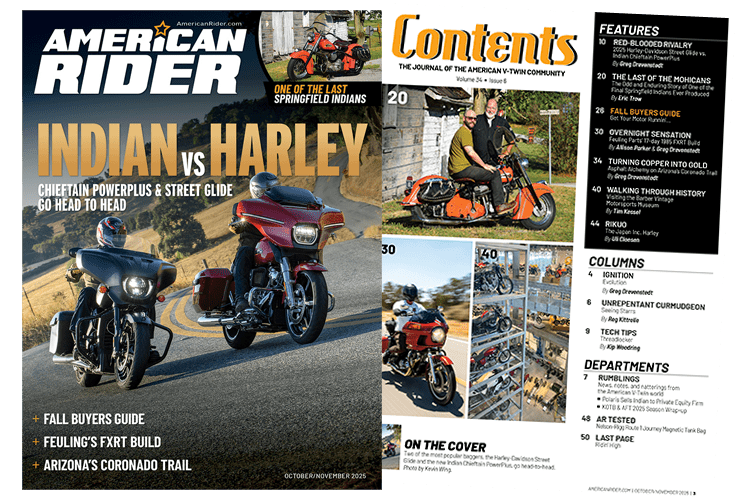
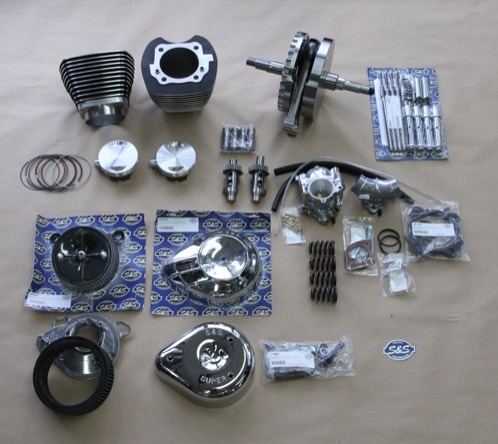
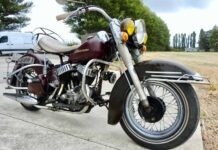


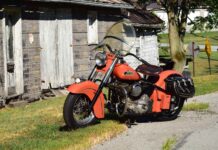
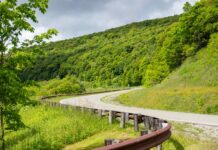
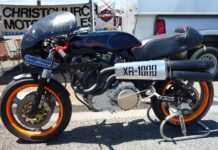










You went fast once on an on ramp trying to beat a semi truck? Oh my goodness you are a daredevil. It sounds like your bike shop does not do well with upgrades, kinda sounds like they don’t have a clue? Sounds like finally they relied on someone with knowledge (s&s) to tell them how to build a motor.
p.s. I tried to pass two semi’s today on my 134ci Fxd down here in miami. I made it past one but had to stop and pee so the second one got away. ( jb hunt) or no maybe it was swift. Either way, when ya pass a semi at 65 on an fxd with 134″ it something to be proud of. Specially when you do it during a wheelie.